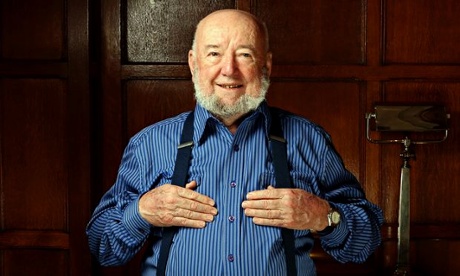
Watching Thomas Keneally in discussion with his biographer, Peter Pierce, you wonder if this is what their hours of interviews in preparation for Pierce's Australian Melodramas: The Fiction of Thomas Keneally were like, or is this just a particular domain that rises between the pair when you place them in front of several indeed people, and tell them they only have an hour to look at Keneally's 50 years as a writer?
Keneally frequently shoots off on tangents, talking with such ferocity he seems certain he will run out of time before he's said all that needs to be said. His biographer, on the other hand, constantly tries to cut Keneally off and bring him back to the topic. Sometimes he is successful; other times Keneally just keeps powering through.
Pierce asks a few of the standard interview questions, but after all the times they've spoken, he's clearly decided to have a bit of fun: giving Keneally a name, and asking him to respond as he'd like. Manly is "closeness between the harbour and the ocean"; "Hope. Hope is Pope Francis."; Joan of Arc is "a stroppy Sheila"; and when he listened to Julia Gillard in opposition, she "sounded like the second coming of a female Christ. When she came into power it didn't come about."
Of course, none of his answers are as brief as that.
Women are a frequent topic of the conversation: Gillard and Joan of Arc, but also the women he has been writing about since the mid 90s, up to his most recent novel, The Daughters of Mars. Writing these female characters, he says, is "one of the great challenges of having grown up in misogynistic institutions."
Women, he says, "are remarkable. They can have the most graphic hysterics if their daughter's room is untidy, but give then a real problem and they just deal with it." And as a writer, he has a theory: "under the cement of Australian manhood, everything we need for a woman is in our subconscious, or in our souls. Somewhere."
Keneally's mind is constantly skipping between themes, back to topics he touched on earlier, and later he tells us "if you're a cryptic crossword aficionado, you know how much comes from the subconscious."
While Keneally and Pierce are jovial, the conversation frequently turns serious. His latest book, A Country Too Far, is an anthology of writing on asylum seekers, which Keneally edited with Rosie Scott, and in conversation Keneally returns to the topic time and time again. "We all know what it would take to make us leave our homes," he says. "And I don't think in the debate that is honoured."
But with such camaraderie between the two men on stage, the session continues to return to joviality. As they discuss collecting art ("This is a session on do-it-yourself superannuation," quips Pierce), Keneally struggles for the name of an artist whose work he collects. "John ... John ... Not John Brack. I'd love a John Brack. Have you got one to give me for my 50th?"
As we leave, we're told we can buy one of Kennealy's books from the "heaving" table outside. After an hour it feels like we've barely began to touch on these works, or indeed the man behind them. We have got but a brief insight into a man who, after fifty years in print, still clearly feels he has many more stories to tell, and many more facets of the world to discover.

